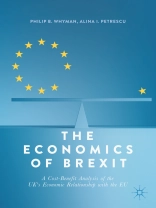This book presents a comprehensive evaluation of the likely economic impact upon the UK economy arising from Brexit. It seeks to assess both the methods adopted, and conclusions reached, by the existing economic studies, and supplements this by providing additional evidence to assist the reader in forming their own assessment of the relative merits of the different approaches. It additionally outlines the options available to policy makers for the formation of an economic strategy capable of adapting the economy to the challenges and opportunities presented by Brexit. Finally, it outlines and comments upon the range of alternative models of future trading relationships that are available to the UK, both in relation to the EU and the rest of the world.
Inhaltsverzeichnis
Chapter 1: Introduction.- Chapter 2: Was there really an Economic Consensus on Brexit?.- Chapter 3: The Fiscal Impact of Brexit.- Chapter 4: Brexit and Trade.- Chapter 5: Foreign Direct Investment (FDI).- Chapter 6: Regulation.- Chapter 7: Migration.- Chapter 8: Economic Growth and Productivity.- Chapter 9: Economic Policy Considerations.- Chapter 10: Alternative Trading Models after Brexit.- Chapter 11: Conclusion.
Über den Autor
Philip B. Whyman is Professor of Economics and Director of the Lancashire Institute for Economic and Business Research (LIEBR), at the Lancashire Business School, University of Central Lancashire, UK. He is author of 11 research monographs, editor of 5 books and author of 50 articles in learned journals.
Alina I. Petrescu is Research Fellow in Labour Economics at the University of Central Lancashire, UK. As part of a research team led by Professor Philip B. Whyman, Alina finds fascination in studying the world of work, bringing to light new insights into flexible practices, migration and organisational performance. Her work projects are listed at www.alinapetrescu.com












